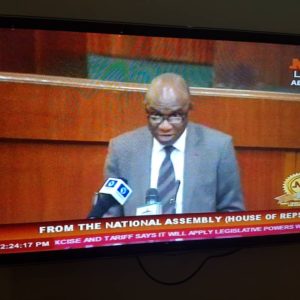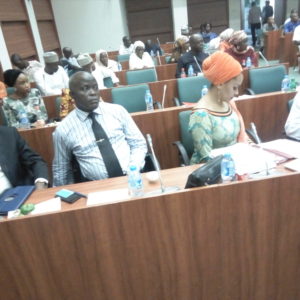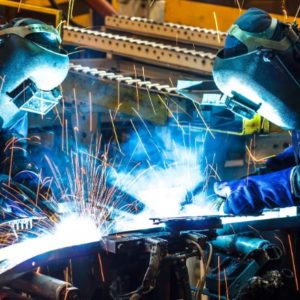Developing A Nation Without Steel: How Feasible? And Lessons From British Steel Scunthorpe And Talbot
I borrowed the title of this article from Chapter 10 of my book ”The Betrayal of the Nigerian Steel Dream-Delta […]

I borrowed the title of this article from Chapter 10 of my book ”The Betrayal of the Nigerian Steel Dream-Delta […]

Honourable Members, it is again my great pleasure to be invited to contribute to the discourse on how to resuscitate, complete and operate the Ajaokuta Steel Plant. Ajaokuta no doubt is strategic to our nation’s industrialization and indeed the steel industry. As enumerated in my earlier submissions, there are many options opened to us as a nation to achieve this important assignment. We only have to be truthful and diligent on the implementation of any of the options in order to realize this .
I have already in my presentations to the Ad-hoc Committee at the interactive session expounded on these options, their merits and demerits. I therefore attach my presentation of 12th March 2018, to this new submission.

Honourable Members, I consider it a great opportunity to once again be invited to contribute to the discussion on the way forward to complete and operationalise the Ajaokuta Steel Plant. My discussions will focus on the following:

The economic recession is no doubt biting hard and many people have advanced possible solutions to get the economy back to normalcy. My training has taught me to solve a problem by first determining the root cause before attempting to proffer solutions and settle for the most cost effective and sustainable solution to the problem. In order therefore to arrive at the most cost effective method or solution to our present economic quagmire we should discuss the root cause.

This topic in my opinion is fundamental to industrialization of any nation. Without a very well articulated strategy for capacity building in design and fabrication of process equipment and plants for small and medium enterprises, a nation will not only remain under developed, it will continue to remain an exporter of raw materials and human capital. Industry multiplies a nation’s wealth.

THE story of Delta Steel Company Owvian-Aladja is undoubtedly one that leaves a sour taste in the mouth of everybody especially the stakeholders. Delta Steel plant, commissioned in 1982 was to usher Nigeria into the league of steel producing countries, an inevitable stepping stone to industrialisation, national development, self-reliance and self-determination as steel has become one of man’s most important technological materials after the First and Second World Wars. With its application cutting across industries and every conceivable aspect of human endeavour such as bridges, high rise buildings and theatres, automobiles, railways, ocean liners, and aircrafts, electrical and electronic equipment, farm tools and tractors, home appliances, food containers and a vast number of products that are used in offices, schools, homes, hospitals and for recreation, steel imports into Nigeria annually will be on the rise from the average USD 3.3 billion.

In this chapter LKY narrated how Singapore under his leadership had to survive without Malaysia who was unwilling to have a common market with Singapore even Singapore was part of it as Malay. Indonesia and had been unfriendly by its confrontation with Singapore escalated unemployment in Singapore.

In this chapter LKY narrated how Singapore under his leadership had to survive without Malaysia who was unwilling to have a common market with Singapore even Singapore was part of it as Malay. Indonesia and had been unfriendly by its confrontation with Singapore escalated unemployment in Singapore. Therefore with no sign of willingness of bilateral trade with Malaysia, Singapore was perceived to be “walking on a razor’s edge” by her allies

In this chapter LKY narrated how Singapore under his leadership navigated the intrigues about the imminent withdrawal of the British troops from Singapore and indeed the Asia because of its need to cut cost and also focus on Europe. The presence of the British forces in the South East Asia was a stabilizing factor for the region especially to Singapore who looked vulnerable to attack from her neighbours and also the communist China and Russia who were ready to step into any vacuum that would be created with the exit of Britain from the region. The United States was already involved in Vietnam and was not in the position to deploy more forces to secure the South East Asia.

Lee Kuan Yew (LKY) in this chapter gave an insight into yet another teething and grave problem that threatened the survival of Singapore as a new independent nation.
Upon independence and forced exit from the federation with Malaysia, Singapore was now surrounded by hostile neighbours in Malaysia and Indonesia. The colonial master Britain was uncommitted to the continued survival as an independent country on the pretext that it did not want to interfere with the internal problems of Singapore. Other nations once though as “friendly” such as Egypt and India due to their national interests stood aloof to help the new nation. Singapore was thus left with no option than to deftly maneuvered the heavily political minefield to secure the continued independence and survival of the new nation.